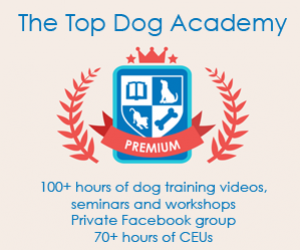All Puppy Classes are Not Created Equal!
As a trainer who does my best to respect other professionals in the field, I understand that not everyone is going to do things the way I do. In dog training, there are often many answers to the same question, and the ones a trainer chooses to pass on to owners are often based on their own view of what training should be or their own professional knowledge. However, when it comes to puppy classes, there are some things that simply cannot be compromised.This week, I was speaking to a puppy-owning daycare client who is taking a puppy class at one of the large pet stores in the area. I had some concerns about her puppy’s responses during play time at daycare and I asked her if she’d seen any of these behaviors in class. She responded with, “Well, we only had off-leash play during the first class. The puppies haven’t been off-leash together since then.” What?!! Seriously, I was absolutely shocked! It took me a moment to process the information, because it simply made no sense to me at all. I didn’t beat around the bush when explaining that she was not receiving what she should be from that class.
While any trainer understands that the average pet dog owner is mostly concerned with housetraining and manners, as are trainers, these are not the only urgent issues in puppy class. The two most urgent issues, the issues that can mean life or death later, are bite inhibition and socialization. Both of these issues REQUIRE lots and lots of off-leash play with other dogs and handling by everyone in the class.
Let me put it another way. Even if your puppy learned how to sit, stand, down, walk nicely on leash, potty outside, do a handstand, cook dinner and remodel the bathroom, none of this would matter a whole lot if your pup had not also learned to inhibit his bite and be comfortable with the world and beings around him. I’m sure many of you have seen dogs who know what sit and down mean, but who bark and lunge at other dogs and people out in public. This is often the result of some good training but a lack of socialization.
To focus on on-leash training while ignoring off-leash play is to put the cart before the horse. Of course it’s important for puppies to learn manners and for owners to learn how to train their pups. But what good is it to end up with an adolescent dog who walks nicely on leash but is inappropriate with other dogs, will do damage should he ever feel the need to bite someone and often feels the need to bite someone because he hasn’t been handled by anyone but his family?
Before signing up for a puppy class, please ask a lot of questions about what your pup will learn and how he will learn it. Ask if you can watch a class before signing up. If the trainer isn’t enthusiastic about socialization, go elsewhere! It’s important to note that simply having off-leash play does not mean your pup will be learning what he needs to learn. Simply put, in a quality puppy class, in my opinion, there isn’t a separation between play time and training time. Instead, play time IS training time. Play time is used to teach manners, recall, focus and appropriate social skills. There should be individual time, too, but the play time should not be a free-for-all.
In my puppy classes, inspired by Dr. Ian Dunbar, we spend 90% of our time with the pups off-leash. In fact, the only time the puppies are on-leash is when we are working on loose leash walking. During play time, owners interrupt play every 15 – 30 seconds and teach their pups to enjoy having their collars gently grabbed. We move on to a gentle grab followed by a sit. Down the line, owners are able to stand at a distance and ask their pup to sit during play. We also practice recalls (“Rover, come!”) during the play session. One owner calls their puppy. If the puppy doesn’t come when called, the other owners remove their pups from the play area and the play session comes to a screeching halt. This is a powerful lesson for Rover, who soon learns that if he wants to continue playing, he’d better go check in with mom when she calls! We hope for squeals and squeaks during play sessions, so that pups can learn how hard is too hard to bite a puppy pal. We let big puppies learn how to play with little puppies, and vice versa. We give everyone a chance to handle all of the puppies in class, wear funny costumes and make lots of strange noises so puppies are not afraid of these things later in life. We invite children, elderly people, big men with hats and beards, older dogs and teenage boys to our class.
Our pups do end up knowing how to potty outside, be comfortable in a crate, chew appropriately, sit, down, stand on cue and to walk nicely on a leash. More importantly, they leave class knowing that they must be very careful when they use their mouths because teeth can hurt. They also learn that the world is full of different kinds of people, dogs, surfaces and sounds that are nothing to worry about and often quite fun! Please check out the Puppy Training videos on this website to get an idea of what a great puppy class looks like!




